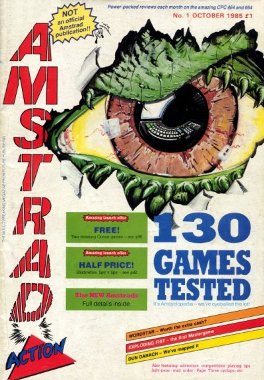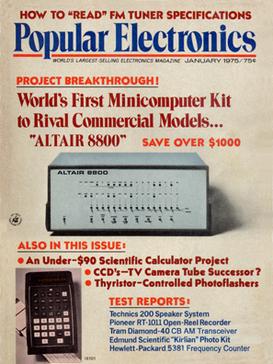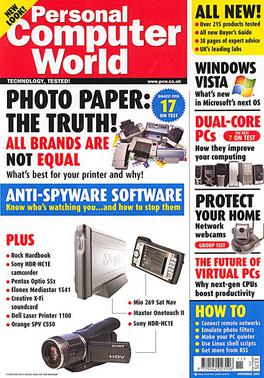
The Nascom 1 and 2 were single-board computer kits issued in the United Kingdom in 1977 and 1979, respectively, based on the Zilog Z80 and including a keyboard and video interface, a serial port that could be used to store data on a tape cassette using the Kansas City standard, and two 8-bit parallel ports. At that time, including a full keyboard and video display interface was uncommon, as most microcomputer kits were then delivered with only a hexadecimal keypad and seven-segment display. To minimize cost, the buyer had to assemble a Nascom by hand-soldering about 3,000 joints on the single circuit board. Later on, a pre-built, cased machine named Nascom 3 was available; this used the Nascom 2 board.

The Amstrad PCW series is a range of personal computers produced by British company Amstrad from 1985 to 1998, and also sold under licence in Europe as the "Joyce" by the German electronics company Schneider in the early years of the series' life. The PCW, short for Personal Computer Word-processor, was targeted at the word processing and home office markets. When it was launched the cost of a PCW system was under 25% of the cost of almost all IBM-compatible PC systems in the UK, and as a result the machine was very popular both in the UK and in Europe, persuading many technophobes to venture into using computers. The series is reported to have sold 1.5 million units. However the last two models, introduced in the mid-1990s, were commercial failures, being squeezed out of the market by the falling prices, greater capabilities and wider range of software for IBM-compatible PCs.

Amstrad Action was a monthly magazine, published in the United Kingdom, which catered to owners of home computers from the Amstrad CPC range and later the GX4000 console.
PC World is a global computer magazine published monthly by IDG. Since 2013, it has been an online-only publication.

Popular Electronics was an American magazine published by John August Media, LLC, and hosted at TechnicaCuriosa.com. The magazine was started by Ziff-Davis Publishing Company in October 1954 for electronics hobbyists and experimenters. It soon became the "World's Largest-Selling Electronics Magazine". In April 1957, Ziff-Davis reported an average net paid circulation of 240,151 copies. Popular Electronics was published until October 1982 when, in November 1982, Ziff-Davis launched a successor magazine, Computers & Electronics. During its last year of publication by Ziff-Davis, Popular Electronics reported an average monthly circulation of 409,344 copies. The title was sold to Gernsback Publications, and their Hands-On Electronics magazine was renamed to Popular Electronics in February 1989, and published until December 1999. The Popular Electronics trademark was then acquired by John August Media, who revived the magazine, the digital edition of which is hosted at TechnicaCuriosa.com, along with sister titles, Mechanix Illustrated and Popular Astronomy.
Newsfield Publications Ltd was a British magazine publisher during the 1980s and early 1990s.

PC Magazine is an American computer magazine published by Ziff Davis. A print edition was published from 1982 to January 2009. Publication of online editions started in late 1994 and continues as of 2024.

Personal Computer World (PCW) was the first British computer magazine. Although for at least the last decade it contained a high proportion of Windows PC content, the magazine's title was not intended as a specific reference to this. At its inception in 1978 'personal computer' was still a generic term The magazine came out before the Wintel platform existed; the original IBM PC itself was introduced in 1981. Similarly, the magazine was unrelated to the Amstrad PCW.

Popular Computing Weekly was a computer magazine in the UK published from 1982 to 1990. It was sometimes referred to as PCW.
ShowShifter, now obsolete, was a proprietary, commercial digital video recorder (DVR) and home theater PC (HTPC) software for Windows.
Guy Johan Kewney was a British journalist, regarded by some as the first UK technology journalist.
Astronomy Now is a monthly British magazine on astronomy and space. According to the Royal Astronomical Society, Astronomy Now is the "principal amateur astronomy magazine in Britain" with a reputed circulation of 24,000.
Igromania is a Russian video game website and formerly a magazine.

Paragon Publishing Ltd was a magazine publisher in the UK, which published computer games and other entertainment titles from 1991 to 2003.
In the November 1980 issue of the UK's Personal Computer World, there was an article written by David Tebbutt, about his visit to the Menlo Park Library where the "ComputerTown USA!" a self-help computer literacy movement, started by the People's Computer Company, was based. That article and the regular CTUK column/page in future issues of PCW in turn sparked a widespread UK based self-help computer literacy movement, called "ComputerTown UK!". Within a few months over 20 local groups sprang up. (See CTUSA! Newsletter Issue 18 Vol 3 No 5 Sept/Oct 1982)

New Computer Express was a weekly magazine published by Future Publishing in the UK from 1988 to 1991.

Batman is a 1986 isometric action-adventure game by Ocean Software for the Amstrad PCW, Amstrad CPC, ZX Spectrum, and MSX, and the first Batman game developed. The game received favourable reviews. An unrelated Batman game was released two years later, titled Batman: The Caped Crusader.

BEEBUG was a magazine published for users of the BBC Micro between 1982 and 1994. It was the first subscription magazine for computers made by Acorn Computers.
The Rugg/Feldman benchmarks are a series of seven short BASIC programming language programs that are used to test the performance of BASIC implementations on various microcomputers. They were published by Tom Rugg and Phil Feldman in the June 1977 issue of the US computer magazine, Kilobaud.









